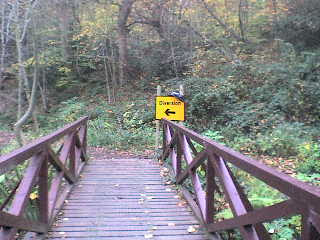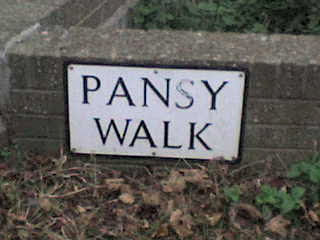Commas
A while ago I had a discussion with M. about the copy-editing skills of the Scotsman editors. They are quite happy to fiddle with her column, and they appear to have some interesting ideas about where commas go. For example, if M. would write a sentence
1. This is an interesting argument, but the conclusions are mistaken.
this is likely to end up in print as
2. This is an interesting argument but, the conclusions are mistaken.
We both agreed that they did it wrong, but it took a while to agree on why they were wrong and what would be right. Or rather, until we found out that we had the same ideas all along, just different ideas of how to express them.
We agreed that in sentence 1, the comma is
before but. In sentence 2, the comma is
after but. Unfortunately, we didn't start the discussion with temporal prepositions, but with locative ones – and there we disagreed. I said that in sentence 1, the comma was
in front of but, and in sentence 2 it was
behind but, but M. thought it was exactly the other way around.
She explained that she sees words as little people that face in the direction you're reading, so their backs are towards what you've already read, and their fronts are towards what you've yet to read. Therefore, in sentence 1, the comma is near what you've already read –
behind but. In my point of view (and, to be honest, in the point of view of all others I have discussed this with) the front of the word is the beginning of the word, the first letter of the word, so that comma in sentence 1 is near the
front of the word.
Could be an interesting psycholinguistics research topic, especially when comparing this to people who are used to reading right-to-left writing like Arabic or Hebrew. (M. claimed having to learn some Hebrew when she was younger might have changed her perceptions of fronts and backs of words.)
TelliesWhy is it
I am sitting behind my desk (working).
I am sitting behind my computer (typing).
I am sitting behind my piano (playing).
I am standing behind the cooker (cooking).
but
I am sitting in front of t' telly (watching a movie).
Or at least in Dutch – ik zit achter mijn bureau, de computer, de piano; ik sta achter het fornuis, het aanrecht but ik zit voor de televisie.Could this also have something to do with perspectives? If you imagine an old-fashioned director's office with a big mahogany desk in the middle of the room, the director would sit
behind the desk from the point of view of the modest office clerk entering the majestic hall. At least this is what I imagine is what lies behind people standing
behind the bar: it's from the perspective of the punters.
Or is it something with activity and passivity? All the ones where you're
behind something are active. You're actively working, you're actively typing, playing the piano, preparing food. Except when you're vegging out
in front of the television, and that's a rather passive activity. Is it the passivity, or just the analogy with televisions, that makes it possible to say
I am sitting in front of the computer watching a DVD.
Is it possible to say that?
Also, is there a difference between standing
in front of the door and standing
behind the door? It seems to me that someone who's standing in front of the door has just rung the doorbell and is waiting to be let in (passive), while someone who's behind the door is possibly hiding, waiting to surprise you or whatever, but is capable of coming in of their own accord (active).
And while we're on the subject of front doors... If I'm inside the house, someone who has just rung the doorbell is standing
in front of the door while the box of candy for trick-or-treat is standing
behind the door. From my perspective, this is wrong. Still, I think it's right.







